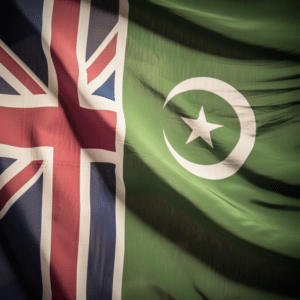The bond between Pakistan and the UK has historical significance. Over the years, the allure of British citizenship for Pakistani nationals has grown, driven by various personal, economic, and social reasons.
This section sheds light on the intricate process of obtaining British citizenship for Pakistani individuals, emphasizing the importance of being well-informed and prepared.
If you want to invest as an expat or high-net-worth individual, or get a second citizenship , you can email me (advice@adamfayed.com) or use these contact options.
The Significance of British Citizenship
British citizenship offers a plethora of opportunities, from access to world-class education and healthcare to the freedom to live and work across the UK. For many Pakistanis, it represents a chance for a better quality of life, enhanced job prospects, and a secure future for their families.
The UK and Pakistan share a rich history, dating back to the colonial era. This shared past has fostered strong cultural, economic, and political ties between the two nations.
Over the decades, many Pakistanis have migrated to the UK, further strengthening this bond. Their contributions to British society, in fields ranging from medicine to arts, have been noteworthy.
Current Pathways to British Citizenship
There are several routes to attain British citizenship for Pakistani nationals:

Naturalisation
This is one of the primary ways to apply for British citizenship. If eligible, individuals can choose the best way to apply based on their unique circumstances.
Indefinite Leave to Remain (ILR)
After living in the UK for 5 years, one can usually apply for ILR. Following this, after 12 months with ILR, they can apply for citizenship.
EU Settlement Scheme
Those with settled status under this scheme must typically reside in the UK for 12 months after obtaining it before applying for citizenship.
Other Eligibilities
There are other circumstances under which one can apply for British citizenship. These include having a British parent, possessing another type of British nationality, being stateless, or being a Chagossian descendant.
The rules and regulations surrounding British citizenship for Pakistani nationals can evolve. It’s imperative to stay updated with the latest information from official sources like the UK government’s website.
This ensures that potential applicants have accurate and current knowledge, increasing their chances of a successful application.
Eligibility Criteria for British Citizenship
Acquiring British citizenship for Pakistani nationals requires meeting specific eligibility criteria set by the UK government. These criteria ensure that applicants have a genuine connection to the UK and are well-integrated into British society.
Residency Requirements
The foundation of the eligibility criteria is the residency requirement. To be eligible for British citizenship, Pakistani nationals must have spent a certain amount of time living in the UK. Specifically:
Duration of Stay
Typically, you must have lived in the UK for at least five years before you can apply for Indefinite Leave to Remain (ILR). Once you obtain ILR, you usually need to live in the UK for an additional 12 months before applying for citizenship.
Absences from the UK
Extended absences can affect your eligibility. It’s crucial to ensure that you have not been away from the UK for prolonged periods during your residency.
Good Character Requirement
British citizenship for Pakistani nationals also hinges on the good character requirement:
Criminal Record
The UK government conducts thorough checks on applicants’ criminal records. A clean record is essential for a successful application.
Financial Responsibility
Your financial standing and tax compliance are also assessed. Demonstrating financial responsibility and ensuring all taxes are up-to-date is crucial.
English Language Proficiency
English language proficiency remains a cornerstone for integration into British society:
Approved Test
The UK government has a list of approved tests that applicants can take to prove their English proficiency. Achieving the required score is vital for eligibility.
Exemptions
Some individuals might be exempt from the English language requirement based on specific circumstances, such as age or long-term residency in the UK.
Language Courses
For those who need assistance in improving their English proficiency, various language courses are available. These courses can help applicants meet the required standard for British citizenship.
Additional Pathways to Eligibility
While the above criteria are standard, there are other pathways and special circumstances that can make one eligible for British citizenship:
British Parentage
Individuals with a British parent or another type of British nationality might be eligible.
British Overseas Territories Citizenship
If you have a parent with British overseas territories citizenship, it could be a pathway for you.
Special Circumstances
Situations such as being stateless, renouncing previous citizenship, or being a Chagossian descendant can also provide eligibility.
Different Paths to British Citizenship for Pakistanis
British citizenship for Pakistani nationals is a sought-after status, and there are several routes to achieve it. Let’s explore these paths in detail.
Naturalization
Naturalization stands out as a prevalent method for Pakistanis to obtain British citizenship. If you’ve resided in the UK for a specific duration and fulfill all other prerequisites, you can pursue British citizenship through this route.
Typically, after living in the UK for five years, you can apply for Indefinite Leave to Remain (ILR). Once you obtain ILR, you usually need to live in the UK for an additional 12 months before applying for citizenship.
Marriage or Civil Partnership with a British Citizen
Being married to or in a civil partnership with a British citizen can expedite your journey to British citizenship. If you’ve lived in the UK for the last three years and either have ILR or settled status under the EU Settlement Scheme, you qualify to apply for British citizenship immediately.
Ancestry and Descent
Having British ancestors can be advantageous when seeking British citizenship for Pakistani nationals. You might be eligible for citizenship if:
- You have a British parent.
- You possess another type of British nationality.
- One of your parents has British overseas territories citizenship.
- You’re a direct descendant of someone born in the British Indian Ocean Territory.

Long Residence in the UK
A prolonged stay in the UK can also lead to British citizenship. If you have ‘settled status’ under the EU Settlement Scheme, you typically need to reside in the UK for 12 months after obtaining it to be eligible for citizenship.
Additionally, Commonwealth citizens, including those from Pakistan, who arrived in the UK before 1973 and have lived in the UK without being away for more than two years, might qualify for citizenship under the Windrush Scheme.
Other Eligibility Criteria
There are other circumstances under which you can apply for British citizenship:
- If you’re stateless.
- If you previously renounced your British citizenship.
- If other special circumstances apply to you, such as being a Chagossian descendant.
The Application Process
Acquiring British citizenship for Pakistani nationals requires a thorough understanding of the application process. The UK government has set specific guidelines and procedures to ensure that only eligible individuals receive citizenship.
Document Preparation
- Birth Certificates and Identification: These serve as proof of your identity and age. Ensure that all documents are original or certified copies.
- Proof of Residence: This can be utility bills, rental agreements, or bank statements that show your address in the UK.
- Financial Records: These are essential to demonstrate your financial stability and tax compliance in the UK.
Filling Out the Application Form
Once you’ve gathered all the necessary documents, the next step is to fill out the application form. The UK government provides different ways to apply for British citizenship based on individual circumstances.
For instance, if you have indefinite leave to remain (ILR) or settled status under the EU Settlement Scheme, this counts as permission to stay.
Payment of Fees
The application process for British citizenship for Pakistani nationals also involves paying certain fees. Ensure you use the accepted payment methods to avoid any delays or complications. It’s essential to check the current fee structure on the official UK government website to stay updated.
Awaiting Approval and Citizenship Ceremony
After submitting your application, the Home Office will review it. Once they approve your application, you will receive an invitation to attend a citizenship ceremony.
This ceremony marks a significant moment, as it’s the final step in your journey to obtaining British citizenship for Pakistani nationals. During the ceremony, you’ll take an oath of allegiance to the UK, signifying your commitment to your new country.
Potential Challenges and How to Overcome Them
Acquiring British citizenship for Pakistani nationals is a significant achievement, but like any bureaucratic process, it presents its challenges. Here, we’ll discuss the common hurdles faced by applicants and provide actionable solutions.
Delays in Processing
One of the most common challenges faced by those seeking British citizenship for Pakistani nationals is the delay in processing. These delays can arise due to various reasons:
Incomplete Documentation
Ensure you submit all required documents. Missing or incomplete documentation can lead to unnecessary delays.
High Volume of Applications
Sometimes, the Home Office receives a surge in applications, leading to processing delays. While you can’t control this, regularly checking the status of your application and staying updated can help manage expectations.
Verification Processes
The Home Office conducts thorough background checks. If there’s any discrepancy in the information provided, it can lead to delays. Always provide accurate and consistent information.

Application Denials
Another significant challenge is the denial of applications. Here are some reasons why the Home Office might deny an application for British citizenship for Pakistani nationals:
Failure to Meet Residency Requirements
Ensure you meet the residency requirements, including the specific time you’ve spent in the UK and any absences.
Character Issues
The UK government takes the good character requirement seriously. Any criminal records or financial discrepancies can lead to denials. It’s crucial to maintain a clean record.
English Language Proficiency
Failing to prove your English language proficiency can result in a denial. Take approved tests and provide valid certificates.
Appealing a Denial
If the Home Office denies your application for British citizenship for Pakistani nationals, don’t lose hope. You have the right to appeal the decision. Here’s how:
Understand the Reason
Before appealing, understand the reason for denial. The Home Office will provide a detailed explanation.
Seek Legal Advice
Consider consulting with an immigration lawyer. They can guide you on the best course of action and help you prepare a robust appeal.
Reapply
If your circumstances change or if you can address the reasons for denial, consider reapplying. Ensure you meet all the criteria before submitting a new application.
Rights and Responsibilities of British Citizens
Achieving British citizenship is a significant milestone, especially for Pakistani nationals. With British citizenship, Pakistani individuals unlock a plethora of rights and privileges that enhance their quality of life and provide them with numerous opportunities.
Rights of British Citizens
- Access to Public Services: British citizenship for Pakistani nationals means they can now access a wide range of public services in the UK. This includes healthcare through the National Health Service (NHS), education, and social care services.
- Freedom to Live and Work: One of the most sought-after benefits of British citizenship for Pakistani nationals is the freedom to live and work not only in the UK but also in the European Union. This opens doors to diverse job opportunities and the chance to reside in any of the EU member countries.
- Voting Rights: British citizenship grants individuals the right to vote in local and national elections. This means they can have a say in the political decisions that shape the country.
- Passport Privileges: Holding a British passport is a significant advantage. It’s one of the most powerful passports globally, allowing visa-free or visa-on-arrival access to numerous countries.
Responsibilities of British Citizens
- Paying Taxes: Every British citizen must ensure they pay their taxes diligently. This contribution supports the nation’s infrastructure, public services, and welfare programs.
- Jury Duty: Serving on a jury is a civic responsibility. When called upon, citizens must participate in the judicial process, ensuring justice prevails.
- Upholding the Law: British citizenship for Pakistani nationals, like all other citizens, means they must respect and adhere to the laws of the land. This includes everything from traffic rules to more significant legal mandates.
- Community Participation: Being an active member of the community is an unwritten responsibility. It’s encouraged for citizens to engage in community activities, support local initiatives, and contribute to the betterment of society.

Conclusion and Final Thoughts
Acquiring British citizenship for Pakistani nationals is not just a process but a journey that intertwines two rich histories and cultures. The UK government provides various avenues for Pakistani nationals to become British citizens, reflecting the deep-rooted ties between the two nations.
Recent data from the UK government highlights the multiple pathways available for those seeking British citizenship. Whether it’s through naturalization, marriage to a British citizen, or having a British parent, the opportunities are diverse.
For instance, if a Pakistani national has lived in the UK for three years and is married to a British citizen, they can apply for citizenship immediately, provided they have either indefinite leave to remain (ILR) or settled status under the EU Settlement Scheme.
Moreover, the Windrush Scheme provides another avenue for Commonwealth citizens, including those from Pakistan. If you or one of your parents arrived in the UK before 1973 and have lived in the UK without being away for more than two years, this scheme might be applicable to you.
In essence, the dream of British citizenship for Pakistani nationals is not just attainable but is supported by a myriad of options and a government that recognizes the value of diverse cultures.
The intertwining of British and Pakistani cultures enriches the UK’s social fabric, making the journey towards British citizenship for Pakistani nationals not just a legal process but a celebration of shared histories and futures.
Pained by financial indecision?

Adam is an internationally recognised author on financial matters with over 830million answer views on Quora, a widely sold book on Amazon, and a contributor on Forbes.



